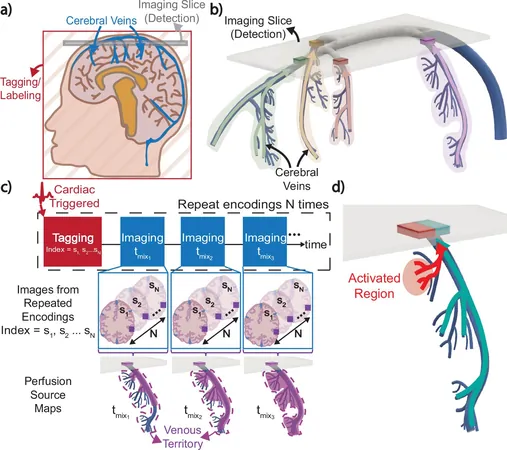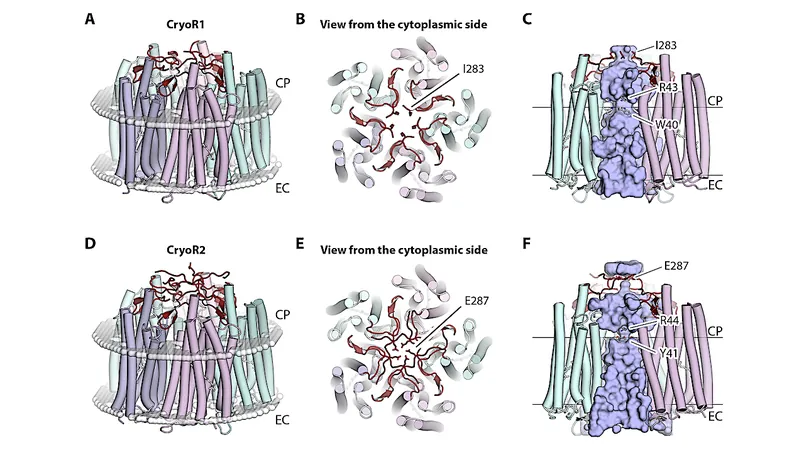
Revolutionary MRI Technique Could Transform Our Understanding of Brain Health
2025-06-02
Author: Arjun
A Breakthrough in Brain Imaging
Unlocking the secrets of our brain's venous system just got a lot easier! Researchers at UC Berkeley have unveiled a groundbreaking MRI technique that not only maps blood flow but does so in reverse, providing unprecedented insight into brain physiology.
What is DiSpect MRI?
Published in *Nature Communications*, the new method, called Displacement Spectrum (DiSpect) MRI, utilizes an innovative imaging approach to track blood flow back to its source in the brain's intricate network of veins. This could revolutionize how we understand and diagnose neurological conditions.
How It Works: The Science Behind DiSpect
Like other MRI techniques, DiSpect harnesses the water in our blood as a tracer to monitor perfusion—or blood flow—in the brain. But here’s where it gets exciting: DiSpect uniquely captures the 'memory' of nuclear spins in hydrogen atoms, allowing the researchers to trace the travels of blood as it drains from tiny capillaries into larger veins.
Real-Time Insights Into Blood Flow Changes
In remarkable demonstrations, DiSpect successfully identified blood flow variations, such as those triggered by caffeine consumption or basic motor activities like hand squeezing. During these movements, it revealed how blood redistributes from passive areas of the brain to those actively engaging in neuronal tasks—a phenomenon previously difficult to visualize with standard MRI methods.
Implications for Neuroscience and Treatment
The implications of DiSpect are vast. By enhancing our understanding of neurovascular coupling—the relationship between neuronal activity and blood flow—this method may aid in diagnosing a variety of vascular and neurological conditions. Lead researcher Ekin Karasan emphasizes its potential for a new, less invasive approach to assess arteriovenous malformations, which are abnormal clusters of blood vessels that can complicate brain health.
The Future of Brain Health Monitoring
Imagine a world where we can assess the health risks of brain conditions without invasive procedures! With DiSpect, clinicians could pinpoint the arterial sources feeding these malformations quickly and effectively, minimizing patient risk while enhancing treatment decisions.
A Quantum Leap in Brain Research
As Michael Lustig, the principal investigator, noted, this cutting-edge technology operates at the atomic level, opening doors to exciting scientific discoveries. DiSpect’s unique imaging could redefine how we look at brain activity, leading to new understanding and treatment strategies in neuroscience.




 Brasil (PT)
Brasil (PT)
 Canada (EN)
Canada (EN)
 Chile (ES)
Chile (ES)
 Česko (CS)
Česko (CS)
 대한민국 (KO)
대한민국 (KO)
 España (ES)
España (ES)
 France (FR)
France (FR)
 Hong Kong (EN)
Hong Kong (EN)
 Italia (IT)
Italia (IT)
 日本 (JA)
日本 (JA)
 Magyarország (HU)
Magyarország (HU)
 Norge (NO)
Norge (NO)
 Polska (PL)
Polska (PL)
 Schweiz (DE)
Schweiz (DE)
 Singapore (EN)
Singapore (EN)
 Sverige (SV)
Sverige (SV)
 Suomi (FI)
Suomi (FI)
 Türkiye (TR)
Türkiye (TR)
 الإمارات العربية المتحدة (AR)
الإمارات العربية المتحدة (AR)